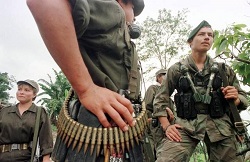Colombia’s Attorney General has announced what appears to be the first ever seizure of mining-related FARC assets, potentially stirring up the already turbulent process of finding a resolution to the FARC peace crisis.
“Last Friday, we seized the first FARC assets generated by illegal mining in [the eastern department of] Vichada,” Attorney General Néstor Humberto Martínez told the Senate on October 25 during a debate surrounding the country’s rising coca cultivations, El Tiempo reported. The seizure amounted to nearly $3.4 million (10 billion Colombian pesos).
Colombia’s top prosecutor explained that the Revolutionary Armed Forces of Colombia (Fuerzas Armadas Revolucionarias de Colombia – FARC)’s illegal mining operations involved forcing indigenous people to sign “false receipts” that were linked to a fake export cooperative in the city of Medellín.
The Attorney General’s Office has identified and seized FARC assets in the past, but the guerrillas are thought to have vast amounts of money stashed away.
Martínez has made his tough stance on FARC assets evident since a peace deal between the Colombian government and the guerrilla organization was finalized in August. In September, he demanded that the guerrillas turn over all of their assets before the plebiscite on October 2, or they would be prosecuted for money laundering under the ordinary justice system.
But the public vote narrowly rejected the peace agreement, creating a judicial uncertainty surrounding the FARC and their activities.
SEE ALSO: Coverage of FARC Peace
In fact, it is quite possible that the filtering of information surrounding the FARC’s true wealth will antagonize the Colombian public further. The FARC’s disclosure that they were drawing up a list of their assets the day before the plebiscite — after repeatedly claiming they had no riches to speak of — probably contributed to tilting the vote against them.
InSight Crime Analysis
The FARC guerrillas are currently in a tight spot — the unexpected “no” vote has stalled the demobilization process, Colombia’s political opposition may demand unpalatable changes to the original deal, and the rebels have been hurled into a judicial limbo. At a peace forum on October 24, Martínez stated that at the FARC’s last conference — during which the peace agreement was unanimously approved — the organization declared their “status as rebels” was over. With no amnesty law protecting them, this means that FARC members are now subject to the ordinary justice system, he said.
Now that state prosecutors are making good on recent threats to net the FARC’s wealth, guerrilla factions may well retreat into clandestineness to protect themselves as well as to earn some income. The FARC’s top leadership has admitted that coffers are running dry, which will inevitably tempt units back to their criminal economies.
SEE ALSO: FARC, Peace and Possible Criminalization
The FARC’s money is potentially the Achilles’ heel of the organization, and could be a factor that contributes to future fragmentation. To understand why, it is important to take a look at the guerrillas’ financial structure.
Unlike traditional drug trafficking networks, the FARC’s illegal earnings — which InSight Crime estimates are around $400 million a year — climb from the bottom up. The FARC’s numerous fronts, mobile columns and tactical units each generate their own revenue, and are expected to push the money up to bloc level, which in turn feeds the General Staff and Secretariat. In the case of powerful drug trafficking fronts such as the 16th or 57th, these profits could be in the millions.
But the lion’s share of this money sticks at front level, with a relatively little amount trickling its way up to the top command in the Secretariat. This increases the likelihood of self-sustaining units breaking away from the precarious peace process, and from the FARC organization.
For this reason too, it was always unlikely that the FARC would surrender the entirety of their riches, much of which is hidden abroad or behind frontmen in Colombia. Yet this may be what makes them most vulnerable — even if a new peace deal is eventually implemented, guerrillas risk losing their judicial benefits if any undeclared assets are later discovered by authorities.

